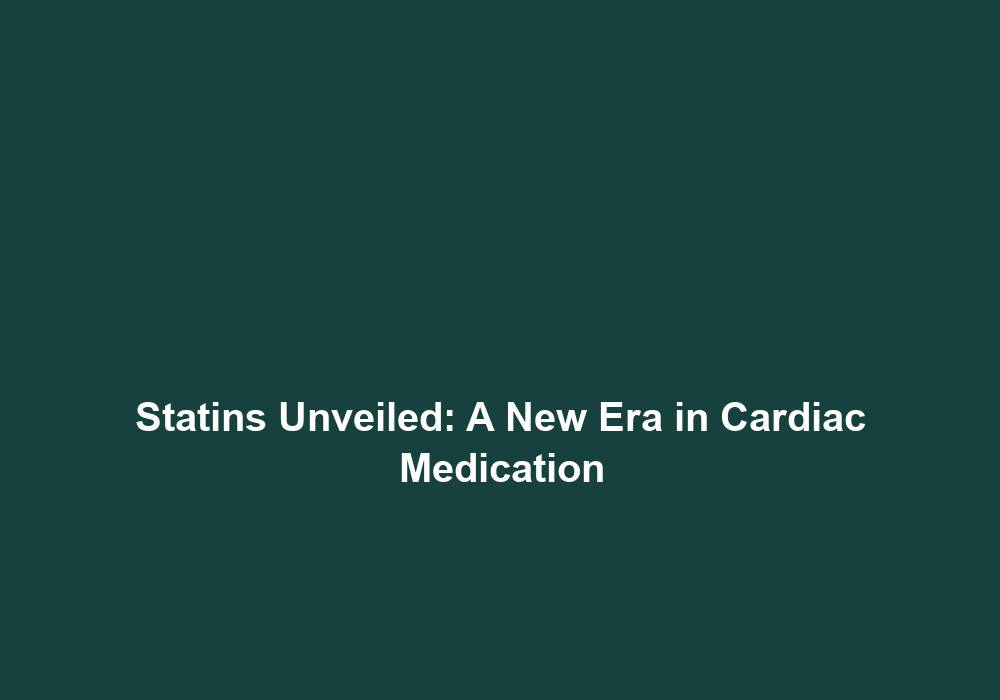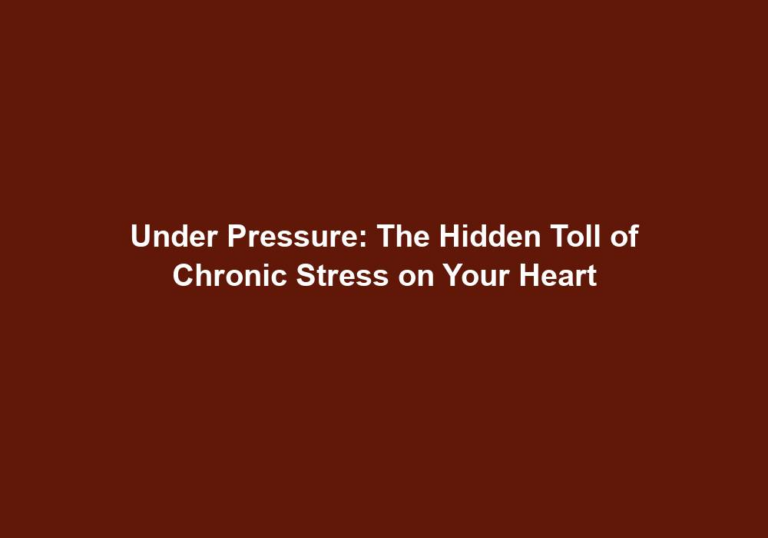Statins Unveiled: A New Era in Cardiac Medication
Cardiovascular diseases have been a prominent health concern for decades, causing millions of deaths worldwide. In recent years, a significant breakthrough in cardiac medication has taken place with the introduction of statins. These drugs have revolutionized the treatment and prevention of heart diseases, offering hope to individuals at risk. In this article, we will explore the world of statins, their benefits, potential side effects, and their role in shaping a new era in cardiac medication.
Understanding Statins
Statins are a class of medications primarily used to lower cholesterol levels in the blood. They work by inhibiting the enzyme HMG-CoA reductase, which plays a crucial role in cholesterol production within the body. By reducing cholesterol synthesis, statins effectively lower LDL cholesterol, also known as bad cholesterol, which is a major contributor to the development of cardiovascular diseases.
Statins not only lower LDL cholesterol levels but also have other beneficial effects on the cardiovascular system. Let’s delve deeper into the benefits of statins.
The Benefits of Statins
-
Reduced Risk of Heart Disease: The primary benefit of statins is their ability to lower LDL cholesterol levels, which directly reduces the risk of heart disease. Studies have shown that statins can significantly reduce the occurrence of heart attacks, strokes, and other cardiovascular events. By keeping cholesterol levels in check, statins help maintain the health and integrity of the blood vessels, reducing the risk of plaque formation and narrowing of the arteries.
-
Prevention of Atherosclerosis: Atherosclerosis is the buildup of plaque in the arteries, narrowing them and restricting blood flow. Statins not only lower cholesterol levels but also help stabilize plaque, preventing its rupture and reducing the risk of blood clots. This stabilization of plaque contributes to the prevention of heart attacks and strokes.
-
Anti-inflammatory Properties: Recent research suggests that statins may have additional benefits beyond cholesterol reduction. They possess anti-inflammatory properties that can reduce inflammation within the blood vessels, promoting better cardiovascular health. Inflammation plays a significant role in the development and progression of cardiovascular diseases. By reducing inflammation, statins help maintain the health of blood vessels and reduce the risk of complications.
-
Improved Endothelial Function: The endothelium is the inner lining of blood vessels, and its dysfunction is a key factor in the development of heart diseases. Statins have been shown to improve endothelial function, enhancing blood flow and overall cardiovascular health. By promoting the proper functioning of the endothelium, statins contribute to the prevention of heart diseases and ensure optimal blood circulation.
In addition to these benefits, statins have been found to have a positive impact on other aspects of cardiovascular health, such as reducing the risk of blood clots and improving the function of the heart muscle. These multifaceted benefits make statins a valuable tool in the management of heart diseases.
Potential Side Effects of Statins
-
Muscle Pain and Weakness: The most commonly reported side effect of statins is muscle pain and weakness. This occurs in a small percentage of individuals and is usually reversible upon discontinuation of the medication. However, it is important to consult with a healthcare professional if one experiences persistent muscle symptoms while taking statins. In some cases, a change in dosage or switching to a different statin may alleviate these symptoms.
-
Liver Damage: Rare cases of liver damage have been associated with statin use. Regular liver function tests are typically recommended to monitor any potential abnormalities. It is crucial to discuss any underlying liver conditions with a healthcare provider before starting statin therapy. By monitoring liver function, healthcare professionals can ensure the safe and effective use of statins.
-
Digestive Issues: Some individuals may experience gastrointestinal side effects such as constipation, diarrhea, or nausea when taking statins. These symptoms are usually mild and transient but should be reported to a healthcare professional if persistent. Adjusting the dosage or timing of statin intake may help alleviate these digestive issues.
-
Increased Blood Sugar Levels: Statins have been known to slightly increase blood sugar levels, especially in individuals with diabetes or prediabetes. Regular monitoring of blood glucose levels is important in such cases. Healthcare professionals can work with patients to manage blood sugar levels effectively while on statin therapy.
It is essential to note that the benefits of statins generally outweigh the potential side effects. However, close monitoring and communication with healthcare professionals are crucial to ensure the safe and effective use of statins.
Guidelines for Statin Use
Statin therapy is typically prescribed based on an individual’s cholesterol levels, overall cardiovascular risk, and medical history. The following are general guidelines for statin use:
-
High Cholesterol Levels: Statins are commonly prescribed for individuals with high LDL cholesterol levels (above 190 mg/dL), regardless of cardiovascular risk factors. Lowering cholesterol levels in this population is crucial to reduce the risk of heart diseases.
-
Cardiovascular Risk Assessment: For individuals with lower cholesterol levels, a thorough evaluation of cardiovascular risk factors such as age, family history, smoking status, blood pressure, and diabetes is conducted. This assessment helps determine the need for statin therapy. By considering multiple risk factors, healthcare professionals can make informed decisions regarding statin treatment.
-
Prevention of Recurrent Events: Individuals who have already experienced a cardiovascular event, such as a heart attack or stroke, are often prescribed statins to prevent future occurrences. Statins play a crucial role in reducing the risk of recurrent events and improving long-term outcomes for these individuals.
It is important to note that statin therapy is individualized, and healthcare professionals will consider various factors before prescribing statins. Regular follow-ups are necessary to assess the effectiveness of treatment and make any necessary adjustments.
Lifestyle Modifications Alongside Statin Therapy
While statins play a vital role in managing heart health, they should be complemented with healthy lifestyle modifications. The following lifestyle changes can further enhance the benefits of statin therapy:
-
Healthy Diet: Adopting a diet rich in fruits, vegetables, whole grains, lean proteins, and healthy fats can help reduce cholesterol levels and improve overall heart health. Limiting the intake of saturated and trans fats is crucial. Incorporating foods high in omega-3 fatty acids, such as fatty fish, can also be beneficial for heart health.
-
Regular Exercise: Engaging in regular physical activity, such as brisk walking, swimming, or cycling, can boost cardiovascular health, lower cholesterol levels, and improve overall well-being. Aim for at least 150 minutes of moderate-intensity exercise or 75 minutes of vigorous-intensity exercise per week.
-
Smoking Cessation: Smoking is a major risk factor for heart diseases. Quitting smoking or seeking professional help to quit can significantly reduce cardiovascular risk. Healthcare professionals can provide resources and support to individuals who want to quit smoking.
-
Weight Management: Maintaining a healthy weight through a balanced diet and regular exercise can improve cholesterol levels and reduce the risk of heart diseases. Losing excess weight, particularly abdominal fat, can have significant benefits for cardiovascular health.
-
Stress Management: Chronic stress can negatively impact heart health. Practice stress management techniques like meditation, deep breathing, or engaging in hobbies to promote overall well-being. Seeking support from healthcare professionals or counselors can also be helpful in managing stress.
By incorporating these lifestyle modifications alongside statin therapy, individuals can optimize their cardiovascular health and reduce the risk of future heart diseases.
Conclusion
The introduction of statins has undoubtedly marked a new era in cardiac medication. These drugs have revolutionized the treatment and prevention of heart diseases by effectively lowering cholesterol levels, reducing the risk of cardiovascular events, and improving overall heart health. While statins offer numerous benefits, potential side effects should be monitored and discussed with healthcare professionals. Moreover, lifestyle modifications should be embraced alongside statin therapy for optimal cardiovascular health. With the right approach, statins can play a pivotal role in mitigating the global burden of heart diseases and improving the lives of millions.







